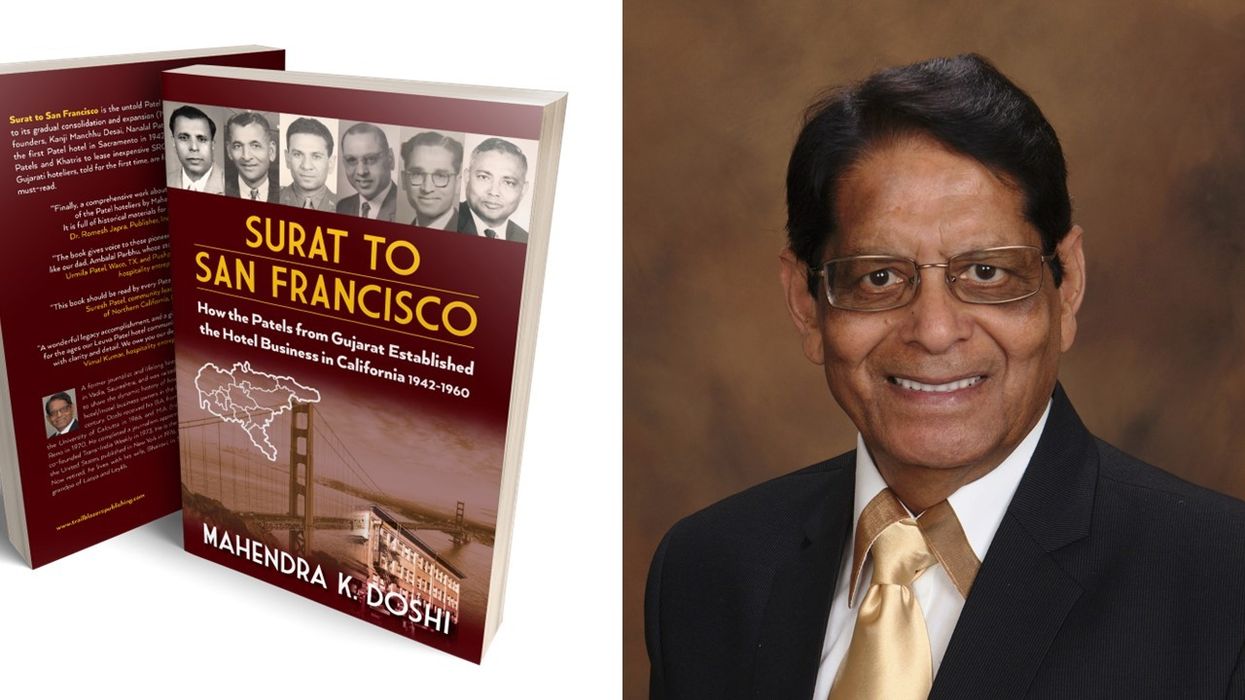THE HISTORY OF Indian immigrants in the U.S. could fill several books, but Mahendra Doshi has captured a core aspect of it with his book “Surat to San Francisco: How the Patels from Gujarat Established the Hotel Business in California 1942-1960.” The book is, as the title says, the story of the individuals who first left their home for a roundabout journey to the American Dream.
Doshi is journalist in San Jose, California, not a businessman himself, but he is originally from Vadia in the Indian state of Gujarat. His family moved to Calcutta in West Bengal where Doshi earned degrees from Presidency College and the University of Calcutta before moving to the U.S. in 1967 and eventual graduated with a master’s degree from the University of Nevada, Reno.
“I have never even thought of business. I had a degree in journalism and I did marketing work for General Motors. That's where I made my living for 30 years,” Doshi said. “At the same time, I pursued my journalistic impulses. I wrote for mostly all those ethnic papers, Indian ethnic papers like India Times of Chicago and India West and India Post.”
Doshi also published two “Who's Who among Indians” lists in 1976 and 1981. That whet his appetite for exploring his people’s history.
“I was thinking to do something about the Indians who came in 1920s and ‘30s, and then one Patel told me, why don't you write our story, nobody has ever written it,” Doshi said. “I started doing research about it and there was nothing about the Patel's while there were hundreds books on Punjabis. So I thought, let me try.”
To research “Surat to San Francisco,” Doshi spent eight years interviewing family members of the three founders of the Patel hospitality business: Naranji “Nanalal” Patel who arrived in the U.S. in 1922, Kanji Manchu Desai, arrived in 1934 and Bhikhu Bhakta, also known as D. Lal, who arrived in 1937.
“I've done a historical study and everything is documented,” he said.
Limitations on Asian migrants in U.S. immigration law in the early 20th century led the three founders to travel to Trinidad and Panama first, where they tried to live as farmers. That did not present a sufficient living for them, Doshi said.
“Someone told them ‘Why don't you go to America, that's where the money is?’” Doshi said. “But they had no way of going to America easily so Kanji Manchu somehow managed a tourist visa or a business visa and he came.”
Desai made a meager living for a while. Then the woman who owned the hotel where he was living was sent to an internment camp during World War II and she asked him to run the motel.
“Kanji Manchu, who was actually at that time suffering from some body aches, said ‘Well, I can't work in the farm, I would rather take work in a hotel,” Doshi said. “So she gave a lease to them for a $350 downpayment and $75 a month and this is how the first Patel started in hotels.”
After the war, immigration laws changed and Desai and the other founders helped other Gujaratis come to California. By 1948 there were more than 2,000 hoteliers in Bay Area, and the law changed again to allow Asians to own real estate, where previously they were only allowed to lease, Doshi said.
“By 1963 or 1964, one Patel bought the first motel in San Francisco and then another guy bought one,” Doshi said. “Then what happened was there was influx of Patels from Africa when Idi Amin and other African countries decided to kick out the Asians and Indians from their countries. Some of them went to London, and then they some of them came here.”
Doshi said by the early 1970s, if you have a $10,000 invested in a hotel, you could get a Green Card.
“By 1970 Patel population had almost quadrupled and every Patel in India or England, or Africa wanted to come to America and get a hotel,” Doshi said.
Now Doshi is working on a book about the second generation of Patel hoteliers.
“I'm working on it and hopefully, I will publish that,” Doshi said.
He also is working on a display in a museum in San Francisco. Doshi said “Surat to San Francisco” has been well received by the Indian American hotelier community.
“Until now, Patel hoteliers lacked a history book to tell our children, our grandchildren and future generations how we came into running hotels and motels,” said Bhulabhai Gopalbhai Patel, hospitality entrepreneur, in a statement on the book’s website. “Mahendra Doshi’s book will forever fill that void.”
This story originally appeared in the December-January 2023-24 issue of Asian Hospitality magazine.






